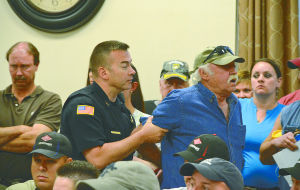Let’s not throw citizens out for video streaming the Legislature
Some House committee and subcommittee chairs announced Tuesday that they are not permitting video streaming in their committee meetings or they won’t allow it without prior permission from the chair, according to a report today in The Tennessean.
Some said the policy will only apply to lawmakers; others did not make that distinction and their statements appeared to suggest it could apply to anyone in the audience.
Cade Cothren, chief of staff for House Speaker Glen Casada, clarified that members of the news media would not be banned from taking video of meetings and told me that only if someone was causing a disruption would they be removed. And, as I understand, a statement further clarifying the issue will be coming soon from House leadership, which I will include here when it’s released. Let’s hope this was all a big misunderstanding.
(Updated: 10:53 a.m.) Statement from Cade Cothren:
House session and committee hearings are and will continue to be shown on the General Assembly’s website and on public television stations across the state. If someone actively violates House policy by disrupting the legislative process — through unruly live-streaming, blatant disregard for decorum, or disrespect of members or the public — they will be removed from the area. Legislators, stakeholders, and those visiting to see government in action must be allowed to do work and enjoy their time without unneeded and senseless disruption. Speaker Casada fully supports his chairmen in their decisions to run their committees as they best see fit.
What constitutes disruption of a public meeting?
On a very basic level, it would be bad form indeed if a House committee chair removed a member of the public from an open legislative meeting simply because they pointed a camera toward the members of the committee who were deliberating about a particular piece of legislation.
It also would be unconstitutional.

Citizen Eddie Overholt was cuffed, arrested and ejected from a public meeting in Greene County in 2014 after he asked the governing body to speak up so people could hear. Charges of disrupting a public meeting were later dropped.
This issue arises from time to time with governing bodies. When can they throw out someone because they are making them uncomfortable by videotaping them? Or because they don’t like how they are represented in the video? Or because they don’t like what they said? Really, never.
Only if a person is truly causing a disruption to the proceeding and threatening the public safety does the governing body have grounds. And in those cases, the governing body should use restraint and take care not to just throw someone out because they don’t like them, or don’t like their views.
Attorney General opinion says camera bans unconstitutional
The Attorney General addressed the issue of banning photographs and cameras in a government proceeding in a detailed and oft-cited opinion in 1995 when the city of Bells wanted to ban the public from taking pictures or video during a public meeting. Some members of the body said individuals appearing before the Board were uncomfortable being videotaped.
In looking at the Tennessee Constitution and the Open Meetings Act, the Attorney General concluded:
“Under Article I, Section 19 of the Tennessee Constitution, a city council may only regulate access to its public meetings in a manner that reasonably serves public safety and welfare, or its ability to conduct orderly and efficient proceedings.
“Based on the authorities discussed above, it is the opinion of this Office that these interests would not be deemed sufficient to justify a total ban on video and photographic equipment at city council meetings or on photographing those present at the meeting. The breadth of the proposed total ban goes well beyond that which is reasonably related to the city’s legitimate interests. This Office is further of the opinion that city governing bodies may regulate the use of such devices, but only in a manner reasonably calculated to serve the public safety and welfare or the interest in conducting efficient and orderly public meetings. For example, a city council may prevent cameras from being operated in a manner that actually disrupts a council’s proceedings, that presents a danger to the public safety, or that otherwise prevents the council from conducting an orderly and efficient meeting. Moreover, a city board would not be required to make special provisions in order to accommodate such devices.”
Discomfort with being on video is not enough
Videotaping that made someone uncomfortable was not enough. The AG said:
“[M] embers of a city governing body advanced a similar argument in Dorrier v. Dark, asserting that their free speech rights were violated by having to deliberate in public. But the Tennessee Supreme Court found that any chilling effect was at most a subjective matter with the individual member of the public body in question and rejected the argument. It is reasonable to assume that Tennessee courts would also reject as a justification for the proposed Bells ordinance the subjective feelings of persons attending a public meeting.”
We don’t have a lot of information about what caused these announcements by committee chairmen, or who was made uncomfortable or how by video streaming. If the ban is aimed just at lawmakers, they are within their bounds to set their rules of decorum. But if aimed at the public, this is a misfire.




